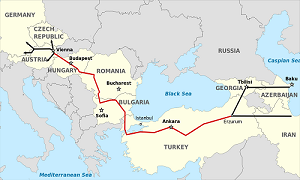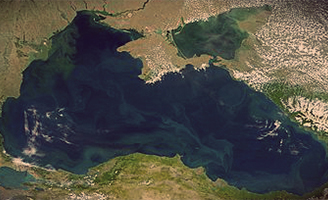Russian Gas in the Southern Gas Corridor Could Undermine the EU’s Diversification Plans
By Ilgar Gurbanov
March 27, 2017, the CACI Analyst
Gazprom has officially declared its willingness to use the Trans-Adriatic Pipeline (TAP) as a route to deliver gas to Europe. TAP is an integral part of the Southern Gas Corridor (SGC) which is one of the priority energy projects for the EU to ensure the continent’s security of supply from a non-Russian source. Although technical and legal possibilities exist for Gazprom’s use of TAP’s expanded capacity, the long-term contracts securing the pipeline’s initial capacity for Azerbaijani gas together with EU legislation makes this option less likely. Nevertheless, the possibility of a Russian bid for TAP could hamper the EU’s diversification plans and block future gas supplies from other non-Shah-Deniz sources.

Future prospects for Caspian energy
By Stephen Blank
October 10th, 2016, The CACI Analyst
There are several signs of a possible turn for the better in the energy prospects of Caspian states, and especially Azerbaijan. The collapse of energy prices appears to have bottomed out. Even prices stagnating at US$ 40-60 a barrel gives energy producers a certain margin to cushion the shocks they will endure. A major aspect of the Caspian states’ comparative advantage is their proximity to Turkey and Southeastern Europe. As European growth recovers, the demand for energy coming through those states will likely grow. Ukraine’s growing freedom from Russian energy coercion will also stimulate it to look for alternatives and new opportunities for Caspian producers. Yet the perhaps most encouraging sign is the construction of new capacities to tie together and eventually integrate the European market.
Russia and Turkey come back to the gas table
By Najia Badykova
July 20th, 2016, The CACI Analyst
On June 27, Moscow announced that Turkish President Recep Tayyip Erdogan sent a personal letter to Russian President Vladimir Putin expressing his “regret and sorrow” for the downing of a Russian plane last November and his wish to reestablish bilateral relations. This ended a seven-month standoff between Turkey and Russia that seriously threatened their political and economic relations. Moscow welcomed the apology. Both sides have strong reasons to resume and reinforce their relations. The rapprochement will allow a restoration of diplomatic relations, and remove trade sanctions and barriers to the development of a number of joint projects, including the planned Turkish Stream gas pipeline under the Black Sea. Yet while Ankara and Moscow may return to pipeline negotiations, the gas supply situation to Europe has changed since November. Moscow has made substantial progress pushing an alternative option – an expansion of the Nord Stream pipeline.
CACI Analyst, May 13, 2015
Contents
Analytical Articles
PAKISTAN AND AFGHANISTAN-INDIA COOPERATION, by Sudha Ramachandran
TURKEY, ARMENIA, AND THE POLITICS OF GENOCIDE RECOGNITION, by Emil Souleimanov
KAZAKHSTAN TO REFORM ITS CULTURAL SECTOR, by Rafis Abazov and Andrey Khazbulatov
WILL TURKISH STREAM COMPETE WITH THE SOUTHERN GAS CORRIDOR?, by Natalia Konarzewska
Field Reports
REPUBLICANS STRENGTHEN POSITION IN RESHUFFLED GEORGIAN GOVERNMENT, by Eka Janashia
KYRGYZSTAN TO HOLD ANOTHER CONSTITUTIONAL REFERENDUM, by Arslan Sabyrbekov
PRESIDENT SARGSYAN AND COUNTERPARTS COMMEMORATE ARMENIAN GENOCIDE, by Erik Davtyan
AZERBAIJAN CRACKS DOWN ON ACTIVISTS AHEAD OF EUROPEAN GAMES, by Mina Muradova
Will Turkish Stream Compete With the Southern Gas Corridor?
By Natalia Konarzewska (05/13/2015 issue of the CACI Analyst)
The Turkish Stream pipeline, envisaged to transport Russian natural gas via the Black Sea to the Turkish-Greek border, is again gaining political momentum and raises interest in the region. On April 7, during a meeting in Budapest, the Foreign Ministers of Hungary, Serbia, Macedonia and Turkey expressed their countries’ interest in participating in the project and discussed possibilities of building European infrastructure for Turkish Stream. As this Russian-backed project targets the same region and is intended to supply roughly the same markets as the Southern Gas Corridor, the question arises whether Turkish Stream will eventually compete with TANAP and TAP in natural gas deliveries to Turkey and Southeast Europe.







